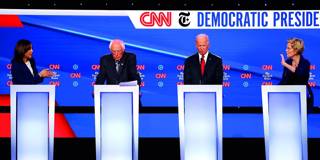The global economy could fall into recession in 2020, and the risk of major military confrontation is higher than it has been since the end of the Cold War. But, with expectations very low, it will not take much to generate positive surprises that could lead to a virtuous circle of economic improvement and less toxic politics.
CAMBRIDGE – Domestic politics, geopolitics, and economics will be intertwined in 2020 to an extent unmatched in decades. Weak economic performance and problematic governance in much of the world risks setting in motion a vicious circle: adverse economic outcomes lead to populism at home and truculent nationalism abroad, which in turn exacerbate economic problems as protectionism increases, investment declines, and consumer confidence falls off. Bad economics drives bad politics, leading to worse economics and worse politics.
Both the bad news and the good news is that economics and politics will start 2020 in a parlous state. The global economy could fall into recession, and the risk of major political or even military confrontation is higher than it has been since the end of the Cold War. From a more optimistic perspective, with expectations very low, it will not take much to generate positive surprises that could lead to a virtuous circle of economic improvement and less toxic politics.
Start with the economics. The International Monetary Fund has coined the term “synchronized slowdown” to refer to our current predicament: growth is decelerating in 90% of the world economy and is expected to be slower overall than at any time since the financial crisis. It is a euphemism for the secular stagnation that increasingly characterizes the global economy. In the current climate of slow population growth, rising inequality and high uncertainty about the absorption of saving is a defining problem.

CAMBRIDGE – Domestic politics, geopolitics, and economics will be intertwined in 2020 to an extent unmatched in decades. Weak economic performance and problematic governance in much of the world risks setting in motion a vicious circle: adverse economic outcomes lead to populism at home and truculent nationalism abroad, which in turn exacerbate economic problems as protectionism increases, investment declines, and consumer confidence falls off. Bad economics drives bad politics, leading to worse economics and worse politics.
Both the bad news and the good news is that economics and politics will start 2020 in a parlous state. The global economy could fall into recession, and the risk of major political or even military confrontation is higher than it has been since the end of the Cold War. From a more optimistic perspective, with expectations very low, it will not take much to generate positive surprises that could lead to a virtuous circle of economic improvement and less toxic politics.
Start with the economics. The International Monetary Fund has coined the term “synchronized slowdown” to refer to our current predicament: growth is decelerating in 90% of the world economy and is expected to be slower overall than at any time since the financial crisis. It is a euphemism for the secular stagnation that increasingly characterizes the global economy. In the current climate of slow population growth, rising inequality and high uncertainty about the absorption of saving is a defining problem.